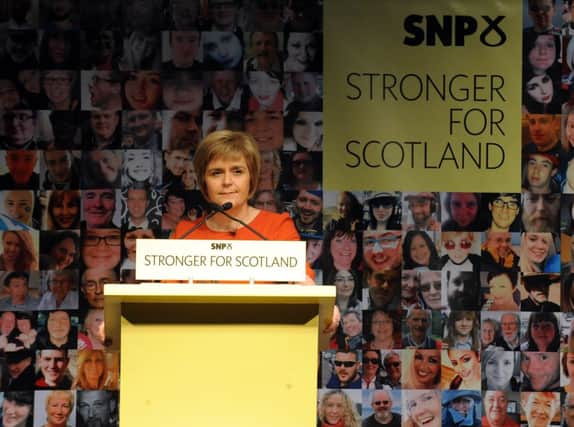Brian Monteith: SNP should rethink EU assumptions


For it is the received wisdom among Scotland’s MacChattering classes that Scotland would vote to stay in the European Union because we are much more sensible than the English.
This is not only a thinly disguised racialist conceit, it is also only an assumption, and as we were reminded in September, many of Scotland’s political assumptions are built on sand.
Advertisement
Hide AdAdvertisement
Hide AdFirstly, let me dispose of Ms Sturgeon’s constitutional inconsistency. I cannot recall at any point she, the not quite retired First Minister, or anyone else from the SNP in a position of authority, suggesting Scotland could not leave the UK if one part of it, a distinct entity such as Orkney and Shetland, voted differently from the rest of Scotland. Or, indeed, if Edinburgh or Aberdeen, two economic powerhouses without which Scotland’s economy would be contracting, said they were staying with the UK.
Four council areas voted for independence but they cannot tell the 28 that said No what to do because the vote is measured on a nationwide population basis. Likewise with an EU referendum, it will be measured on a country-wide population basis from Margate to Mallaig, from Plymouth to Peterhead. Scotland voted for Westminster to continue to represent it on the international stage. Even under Ms Sturgeon’s own proposals for Devo Max that arrangement would still pertain. Is she saying she has abandoned that proposal already?
More absurd than this constitutional calumny is the easy acceptance that Scotland would want to stay in the EU when all the arguments for leaving are rarely heard. This is because they are crowded out by the Nationalists who, without any sense of their hypocrisy, rail against London-based rule that continues to decentralise and devolve power – while Brussels-based rule is centralising, treaty by treaty, regulation by regulation.
There were 1,139 new regulations placed into UK law last year, where is the talk of subsidiarity now? The only constitutional subsidiarity happening in Europe is from Westminster to Holyrood, but don’t expect a Nationalist to demand powers being returned from Brussels to Edinburgh, never mind London.
Scotland’s europhiles smile self-indulgently at the polling showing Scottish support at only 33 per cent for Brexit (British Exit – the fact that I feel I need to explain the term says everything about the low level of debate in Scotland). That share is well behind English figures that usually range between the fifties and sixties, so a Scottish endorsement of the EU is assumed. But because the debate has not yet begun here those supporting withdrawal from the EU will be starting from a base that is higher than the Nationalists enjoyed two years ago. So the context of the Scottish support for leaving the EU downplays the possibility for Scotland voting to leave.
Once we begin to consider the costs of UK membership both in terms of the actual net expenditure and the burdens to our trade I expect Scots to begin to see just how harmful continuing in the EU’s undemocratic and political customs union will be. Seeing the world through the prism of the EU leaves us without a voice on the World Trade Organisation and unable to secure our own free trade agreements with countries such as China.
The furore surrounding the £1.7 billion EU surcharge has come about not because of Britain’s growing economy relative to the German and French performances but from a one-off correction to Britain understating its Gross National Income over more than a decade. The £1.7bn bill is a one-off adjustment, but is no better for that, because it underscores how the UK’s net contribution to the EU has been climbing steadily and the trend is set to continue. The ONS Pink Book shows that back in 2002 Britain’s net payment was only £2.8bn but this had climbed to £11.3bn in 2013, rising £2.7bn alone last year. And that’s before the latest £1.7bn surcharge.
The point is that the EU membership fee is far more expensive than we thought – some £200 million a year extra over the last ten years. Compare this with Switzerland. Without the EU’s unaccountable bureaucracy and countless dysfunctional subsidies through transfers such as the Common Agricultural Policy, Common Fisheries Policy and regional funds, it pays only £150m a year for access to the EU single market. It is obliged to meet EU standards when it trades with its member states – but is free to apply its own laws for any other commerce.
Advertisement
Hide AdAdvertisement
Hide AdEurophiles of all political persuasions talk as if removing the UK from the EU’s undemocratic and costly tentacles would bring economic isolation when the reverse is the case. While some three million British jobs may be connected to our trade with the European Union, there are also some five million EU jobs connected to its trade with the UK. The UK is the EU’s biggest and best customer and the prospect of trade barriers is consequently zero.
The suggestion is made that we would not be able to trade with the EU and that we would lose access to the single market and yet all we would be doing is replicating the position of the US, Australia, India and China who enjoy the trading gains without the membership pains.
The economic and political prospects for the EU are frightening and yet rarely discussed in Scotland. The EU is heading for a demographic time-bomb with a severely ageing population that has high expectations of pensions and healthcare – relying on a tax base that is contracting as the number of EU working-age employees shrinks. Unlike Germany, the UK will see its workforce grow – meaning that the EU will become ever more dependent on financial transfers from our shores.
How odd that the SNP objects to Scottish tax revenues going south to Westminster but is sanguine about bailing out the European Union. Might Scots begin to see this all differently?
SEE ALSO